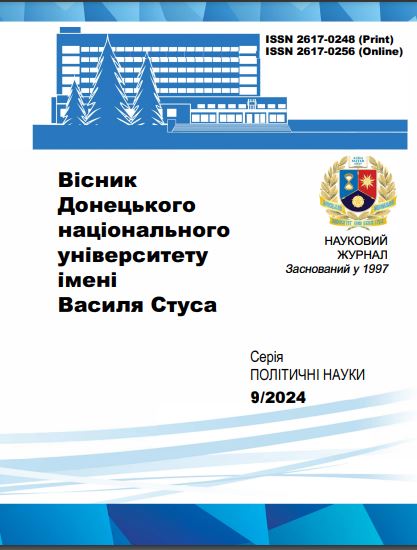Trends of implementation of the decentralization process in the European Union
DOI:
https://doi.org/10.31558/2617-0248.2024.9.7Keywords:
decentralization, subsidiarity, regional policy, European Union, local self-government, management of territorial developmentAbstract
A comprehensive analysis of the political discourse is carried out, which concerns the features of the The study is devoted to the determination of the trends in the implementation of the decentralization process in the European Union. The stages of regional policy implementation in the European Union and integration associations that preceded the emergence of the EU in 1992 are determined. The article pays special attention to the consideration of the principle of subsidiarity in the European Union. It is emphasized that in certain European countries, subsidiarity is considered from a different perspective: for Great Britain, this principle means expanding the competence of the national state as an obstacle to the development of European centralism; it is typical for Germany that subsidiarity should stop the encroachment of the EU on the exclusive powers of the states; for Spain, the inherent opinion is that subsidiarity should not affect the relationship between the state and the autonomous regions. The study distinguishes two conditional types of countries according to the type of administrative management: the first type – regional (regionalized) states – their regions have autonomous status and have powers in the legislative and executive spheres (Italy, Spain and Great Britain); the second type of state is a decentralized state – it is characterized by the fact that the regions have the competence to conduct affairs on regional issues, and also, in accordance with the national legislation, there is an opportunity to make regulatory amendments to the adopted laws and the right to deviate from a number of provisions in favor of the region, if it is allowed (Poland, Portugal, Ireland, the Czech Republic, Denmark, France). Thus, it can be said that the topic of regionalization is discussed rather vaguely in European treaties, and the principle of subsidiarity can be interpreted in different ways, but European regional policy, and, above all, the implementation of programs through the structural and other funds of the European Union, is generally a well-developed mechanism both in economic, political and legal terms.
References
Лелеченко А. П., Васильєва О. І., Куйбіда В. С., Ткачук А. Ф. Місцеве самоврядування в умовах децентралізації повноважень: навч. посіб. К. 2017. 110 с.
Гижко А. П. Світові практики впровадження децентралізації та їх досвід для України. Політичне життя. 2020. № 1. С. 22–29.
Ярошенко А. С. Адміністративно-правовий статус органів місцевого самоврядування в контексті реформи децентралізації. Науковий вісник Ужгородського національного університету. Серія Право. 2021. Вип. 68. С. 211–215.
Шкільняк М. М., Васіна А. Ю., Мельник А. Ф., Монастирський Г. Л., Удосконалення механізмів публічного управління та адміністрування в контексті реалізації потенціалу децентралізації. Вісник економіки. 2021. № 2. С.193-199.
Примуш М. В., Окуньовська Ю. В. Громада як основний елемент місцевого самоврядування. Політичне життя. 2022. № 3. С. 33– 37
Traité instituant la Communauté Economique Européenne 1957. Op. cit. Préambule. P. 11.
Treaty on European Union, signed at Maastricht on 7th February 1992 Op. cit. Art. 3b; Consolidated Version of the Treaty on European Union. Op. cit. Art. 5.
Ohmae K. The Rise of the Region State. Foreign Affairs. 1993. Vol. 72. Is. 2. Pp. 78-83

